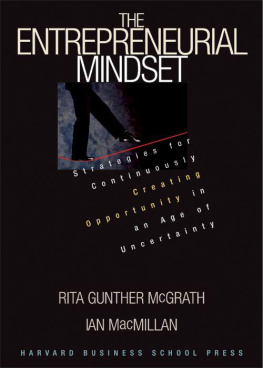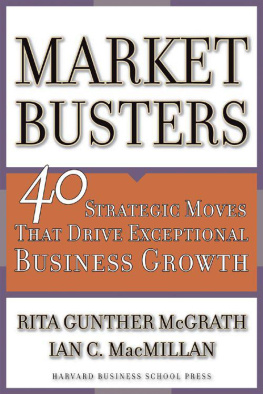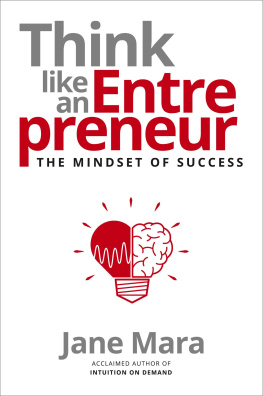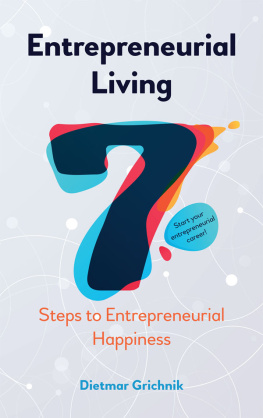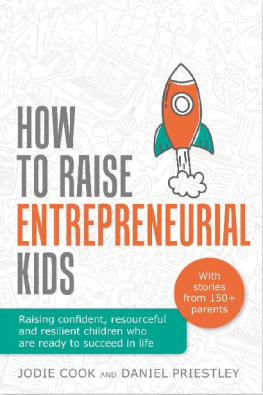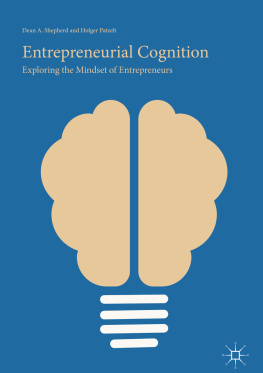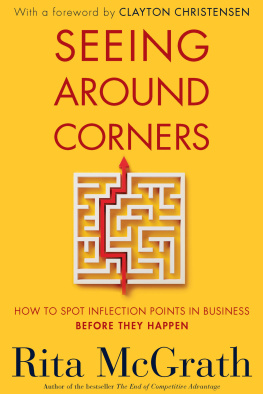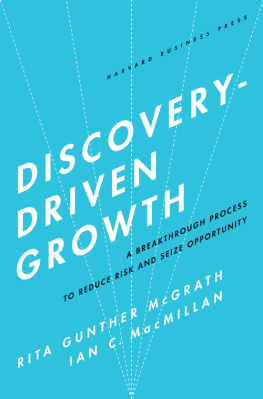Copyright 2000 President and Fellows of Harvard College
All rights reserved
First eBook Edition: August 2000
ISBN: 978-0-8758-4834-1
There was homework and hockey and horseback riding
And the book
There was ballet and swimming and baseball
And the book
There was family and music and travel
And the book
There were friends and gossip and dishes
And the book
For Anne, John, and Matt,
Who good-naturedly lived with a book in the midst of our domestic bliss
R ITA G UNTHER M C G RATH
To Jean, whose sacrifices of time and whose emotional investment to make this book happen cannot be measured.
I AN M AC M ILLAN
CONTENTSTHIS BOOK SUMMARIZES THE PRACTICAL IMPLICATIONS OF OUR accumulation of experience, research studies, and active teaching and working with business organizations attempting to deal with uncertainty and with entrepreneurs learning to launch and grow their businesses. MacMillans early interest in entrepreneurship stemmed from his experience as an entrepreneur, when he worked with John Foggitt to create a global travel business based on novel travel concepts. McGrath also spent time as an entrepreneur, creating first a political consulting business, then a prototype of what one might recognize as a Kinkos type of operation called Unworried Words. Neither venture proved sufficiently attractive to stick with for the long haul, although they were great learning experiences. She began her academic career after closing these businesses to pursue an exciting opportunity in the world of information technology design.
We thought that you, our readers, might be interested in the origins of some of the ideas in this book. The primary thrust of the bookthat uncertainty can yield tremendous opportunity when looked at in the right wayhas long been a topic at the heart of the academic study of entrepreneurship.
Chapter 2 stems from our experiences with teaching entrepreneurship and helping would-be entrepreneurs. One of our most consistent challenges was to get entrepreneurial wanna-bes to make sure that their proposed venture ideas were worthwhile. Accepting proposals for any old venture inevitably generated lists of viable, but basically boring businesses (like dog-walking services). So, we challenged them to think of business concepts that would be worthwhile in comparison with the opportunities they could have working for a large company. Without further ado, the insufficiently profitable ideas vanished. The business equivalent is to make sure at the outset that your ideas have the potential at maturity to contribute in a worthwhile way to your company. This is what we call framing the business.
In chapters 3 and 4 we examine ways of seeing existing product and service offerings in a new light. The material is extensively drawn from fieldwork in which we have analyzed patterns of opportunity recognition by independent entrepreneurs and by managers pursuing corporate ventures. We are particularly fortunate to have worked with Citibank (now Citigroup), Chubb & Son, American Reinsurance, DuPont, and other companies that showed us how new opportunities emerged and how these organizations used them as the basis for new business models. By new business models, we mean the way an organization organizes inputs, converts these into valuable outputs, and gets customers to pay for them. A business model, in other words, is how a business is designed to generate profits.
Chapter 5 builds on research in which we worked with managers of established companies to try to understand their competitive terrain and identify breakthrough opportunities they might otherwise have missed. This work was largely driven by McGraths deep interest in real options reasoning as an approach to strategizing under conditions of uncertainty. As the name suggests, new businesses often begin as optionssmall, uncertain investments that can later prove worthy of further investment. Early experiments can be immensely important later on. Evaluating new technologies as options has been used at global companies such as Merck, Matsushita, and DuPont. DuPont recently sponsored a collaboration in which McGrath was the principal investigator and concluded that the approach gave them a new way to explore opportunities.
Chapters 6 and 11 draw largely on research based on McGraths Ph.D. dissertation, which involved both extensive fieldwork and survey/analysis of new businesses involving new products, new technologies, or new markets begun by established firms. The tools presented in chapter 11 have been used to diagnose the progress of more than one thousand such new business development projects of strategic importance to managers involved in our executive education and research programs.
The insights into the composition of a companys portfolio of business initiatives and the importance of achieving strategic focus and making trade-offs between attractive projects are presented in chapters 7 and 8. These chapters draw largely on our observations of many companies and their corporate venturing programs. Our observations included a four-year engagement by MacMillan in the General Electric Work Out program and more than a decade of interactions with GE managers in the companys Crotonville, New York, facility. We also drew on some of the earliest empirical work on strategy, taking a statistical approach to assessing commonly held assumptions in the strategy arena. One early article, for instance, challenged the widely held belief that businesses classified as dogs in the famous Boston Consulting Groups product/portfolio matrix were inherently unprofitable.
Entry strategies for new markets, the focus of chapter 9, formed a considerable part of MacMillans work on competitive dynamics and were a major thrust of his research in the late 1980s, as the effects of hypercompetition began to become evident to managers of even the most staid businesses. McGrath became involved in applying traditional ideas from competitive dynamics to highly uncertain business environments.
Chapter 10 presents discovery-driven planning, an approach we devised to help managers plan under highly uncertain circumstances. Originating from joint work with Zenas Block, a co-author of MacMillans and a multiple-venture entrepreneur, the concept of discovery-driven planning departs dramatically from conventional strategic planning but is no less disciplined. The concepts underlying it were distilled from Block and MacMillans experiences working with habitual entrepreneurspeople who make a habit of detecting and exploiting the business opportunities that arise from uncertainty. An article on discovery-driven planning was the first of several jointly authored pieces McGrath and MacMillan published in the Harvard Business Review. The methodology is now being actively used by companies such as Intel, Hewlett-Packard, Fluor Daniel, Matsushita, and Sonera.
Chapter 12, a distillation of the practices of entrepreneurial leadership, is based on massive amounts of fieldwork. Our first projects compared the behavior of managers of highly successful corporate venture divisions with that of managers in similar circumstances who appeared unable to create new business opportunities for their firms. Later work drew on our corporate venturing studies, such as the Citiventures project we worked on in the early 1990s. We refer you to other research studies that we use and build on throughout the text as appropriate.
Throughout this book, we have provided figures and tables that allow readers to generate scores and derive conclusions. These materials are all based on considerable theoretical and empirical research. Readers should be aware, however, that the way we suggest that managers might use them to inform their decision making should not be confused with a rigorous empirical methodology. By necessity, we have simplified the tools and omitted additional variables that might be used to assess bias, reliability, and generalizability in the interests of helping practitioners gain some insights into roughly right solutions.

